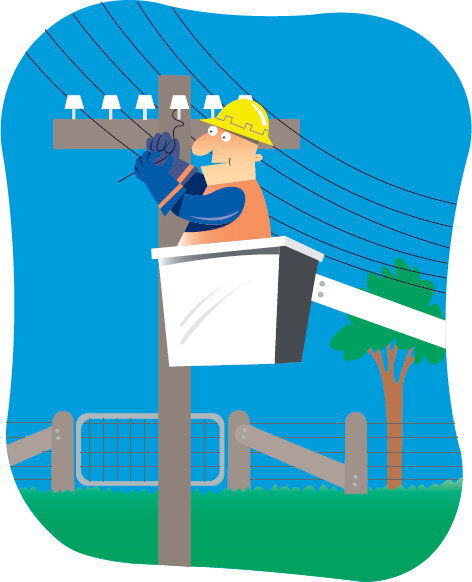
You may experience interruptions to your energy supply for a number of reasons. For example, the interruption may be planned by your distributor to carry out maintenance work, or the interruption may be unplanned, such as an outage from a storm or accident.
Planned interruptions
Planned interruptions are required for maintenance or to upgrade the network.
Electricity
If an electricity distributor or transmitter has planned an interruption that will affect you, you must be given at least 72 hours' notice. The notice can be provided to you individually (e.g. a notice in the mail) or to local customers generally (e.g. a notice in the local newspaper or radio).
If your electricity distributor fails to provide notice of a planned interruption, you will be entitled to a service standard payment.
There are maximum times that planned electricity interruptions should last. Your distributor must make sure that interruptions don’t exceed these lengths, so far as is reasonably practicable.
| 6 hours |
4 hours |
|
If the property is on or south of the 26th parallel of latitude.
|
-
If the property is north of the 26th parallel of latitude.
- If the property is south of the 26th parallel of latitude and the temperature is over 30 degrees celsius.
|
Unplanned interruptions
Unplanned interruptions can occur for reasons such as storms, vandalism, too much demand on the network or someone accidentally damaging the network.
Some customers, particularly those living in remote areas, can experience repeated and/or long interruptions to their energy supply.
Electricity
There are standards for the supply of electricity to customers. If these standards are not met, you are entitled to a service standard payment from the distributor.
If you experience a lot of unplanned interruptions to your electricity supply, there are circumstances where the distributor must fix the causes of the interruption or make an arrangement with you for the alternative supply of electricity.
These circumstances are if your electricity supply:
- has been interrupted non-stop for more than 12 hours; or
- has been interrupted more than nine times (for Perth CBD) or 16 times (elsewhere) in the last year;
and the distributor considers that these types of interruptions are likely to occur at this level of frequency every 1 out of 10 years.
If you are registered with your electricity retailer as having life support equipment, unless the interruption is to restore supply, there must always be a written, individual notice giving you at least 3 business days’ notice of a planned interruption.
If you lose energy, ring your distributor to check if there has been an unplanned interruption and when energy is expected to be restored.
It may be that the problem is only to do with your property e.g. your safety switch has gone off.
When can a distributor go on to my property?
A distributor may need to go on to your property:
- to read your meter;
- to do maintenance work on poles or pipes;
- to fix a problem; or
- in cases of emergency.
If a distributor needs to go on to your property, they must do as little damage as possible, and fix any damage done or compensate you, unless the damage was caused as a result of your own actions (e.g. you damaged powerlines while renovating your backyard, and the distributor caused additional damage in an effort to fix the situation).
No notice required
An electricity distributor does not have to give you notice before coming on your property if there is an emergency or if you are deemed to have given consent.
If you have a contract with an electricity retailer, you will be deemed to have given consent for the electricity distributor to come onto your property to read your meter.
You will also be deemed to have given consent for an electricity distributor to come on your property to perform work if:
- the distributor supplies your electricity; or
- the distributor’s poles are lawfully on your property.
Notice required
A distributor must either seek your consent or give you notice to come on your property:
- electricity: if you are not supplied with electricity by the distributor;
- electricity: if the distributor’s poles are not lawfully on your land; or
- gas: in all cases, other than in an emergency or to read your meter.
The period of notice is normally five days. However, in certain cases, the notice may be given after the distributor came on your property.
Although a distributor may have to give you notice or seek your consent, you cannot specify the times or conditions under which a distributor may come onto your property.
In an emergency, a distributor may always enter your property without notice or consent.

